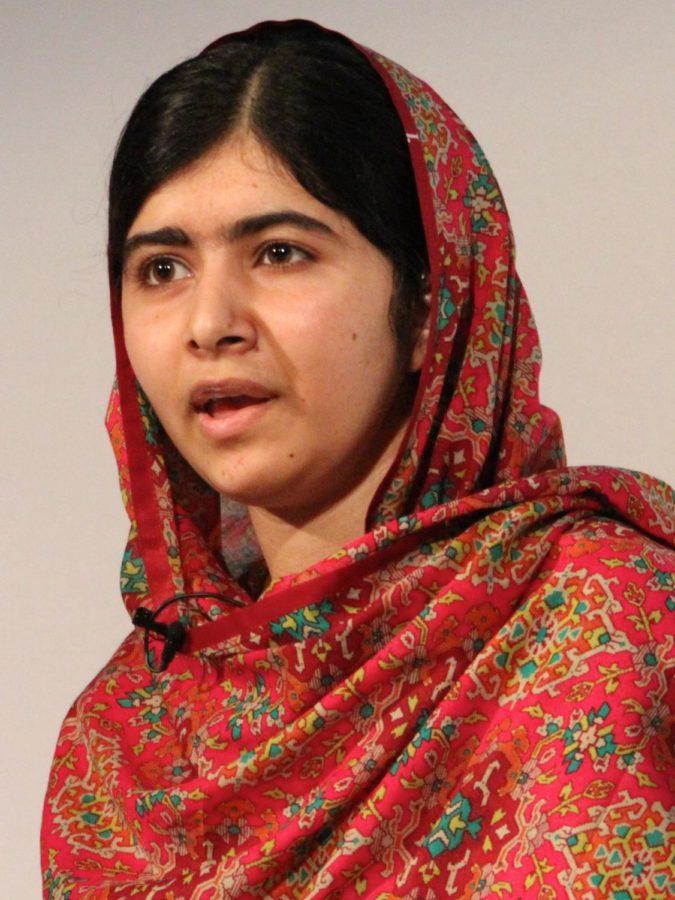‘He Named Me Malala’ advocates for women’s education
Russell Watkins/DFID
Malala Yousafzai recently was awarded with the Nobel Peace Prize. Her documentary, ‘He Named Me Malala’, follows her mission to promote women’s education.
January 28, 2016
In a new Fox Searchlight documentary film ‘He Named Me Malala’, Malala Yousafzai describes her advocacy for educating women around the world.
“I’m telling my story, not because it is different, but because it is not,” Yousafzai said.
Yousafzai spoke out publicly about the Taliban in 2012, criticizing them for their suppression of education, especially women’s education. In retaliation, the Taliban shot her in the head. She has since made a near-full recovery and has been touring the world speaking about women’s rights and education.
Yousafzai knew speaking out would come at great risk.
“The defining moment is [Yousafzai’s] choice to step on camera and speak out against these tyrants and risk her life, and her father’s choice to let her,” said director Davis Guggenheim.
Guggenheim titled the film “He Named Me Malala.” “He” in the title refers to Yousafzai’s father, who knew his daughter would be different and chose to name her after an Afghan woman who rallied an army of men and led them to battle against the British army.
And so she was named. But it was her choice to speak out, despite her father giving her a legacy behind her name.
“Malala takes her own — she takes responsibility for her own actions,” Guggenheim said. “She said, ‘He did not push me. I chose to do this. I chose to speak out.’”
However, we must not forget that Yousafzai would not have decided to speak out without the diligent work of BBC correspondent Abdul Hai Kakar and New York Times reporter Adam B. Ellick.
“I think it’s a journalistic responsibility to give a voice to a voiceless,” said Lisa Munger Oakes, lecturer in the Greenlee School of Journalism and Communication.
All of the parties involved had to take into account the risk they were taking by filming Yousafzai speaking for women’s education.
“You have to think about if it’s the right situation for you at the time,” Munger Oakes said. “There came a point when I was reporting overseas and I needed to be more loyal to my family at home than the next story. I still have friends over there that choose to risk their freedom instead.”
Yousafzai and her father took the biggest chance, risking the rest of their family and the family’s school along with themselves.
“If you ask Malala and her father, and I do in the movie, I think they feel very certain that they did the right thing,” Guggenheim said. “For them, they would rather die than not speak out. It’s a part of their faith, that speaking out against tyranny is something that’s their duty to do.”
Yousafzai feels her duty is to spread awareness to educate women everywhere. Guggenheim, by extension, wants women in places fortunate enough to have education to see Yousafzai’s story and let it fuel them.
“My dream is that girls feel like it’s their movie and they own it,” he said. “It’s too easy for us to make our heroes untouchable and put them on a pedestal, ‘well, I could never be like her.’”
“Truth is, she is just an ordinary girl who became famous because she was brave, and she made an extraordinary choice in her life to speak out,” Guggenheim said.
Guggenheim wants women to realize that any girl could do what Yousafzai is doing, especially by making the film highly accessible to young girls.
“The idea is how do I tell the story from the point of view of a girl … and the way [Malala] was describing it had this sort of storybook [feel], almost like she was closing her eyes at night and remembering it,” Guggenheim said.
To do this, Guggenheim instilled the use of a pastel-style animation during flashback scenes accompanied with voice over of Yousafzai, as if she was reading us a bedtime story.
“Imagine Malala being 11 years old and her head is on her pillow and she’s about to go to sleep and she was imagining the story,” Guggenheim said. “So the idea of animation was to sort of capture that feeling and to really make it feel like she was telling it to us.”
As Malala said before, this issue is not unique and is often overlooked because of its commonplace nature. Something different has to be done to put a focus on the importance of women’s education.
“I wanted to open up this world in a way that hadn’t been opened up — to show this part of the world and this narrative in a way that’s never been shown before,” Guggenheim said.
For more infomation, visit the Fox Searchlight Web Page for “He Named Me Malala.”







